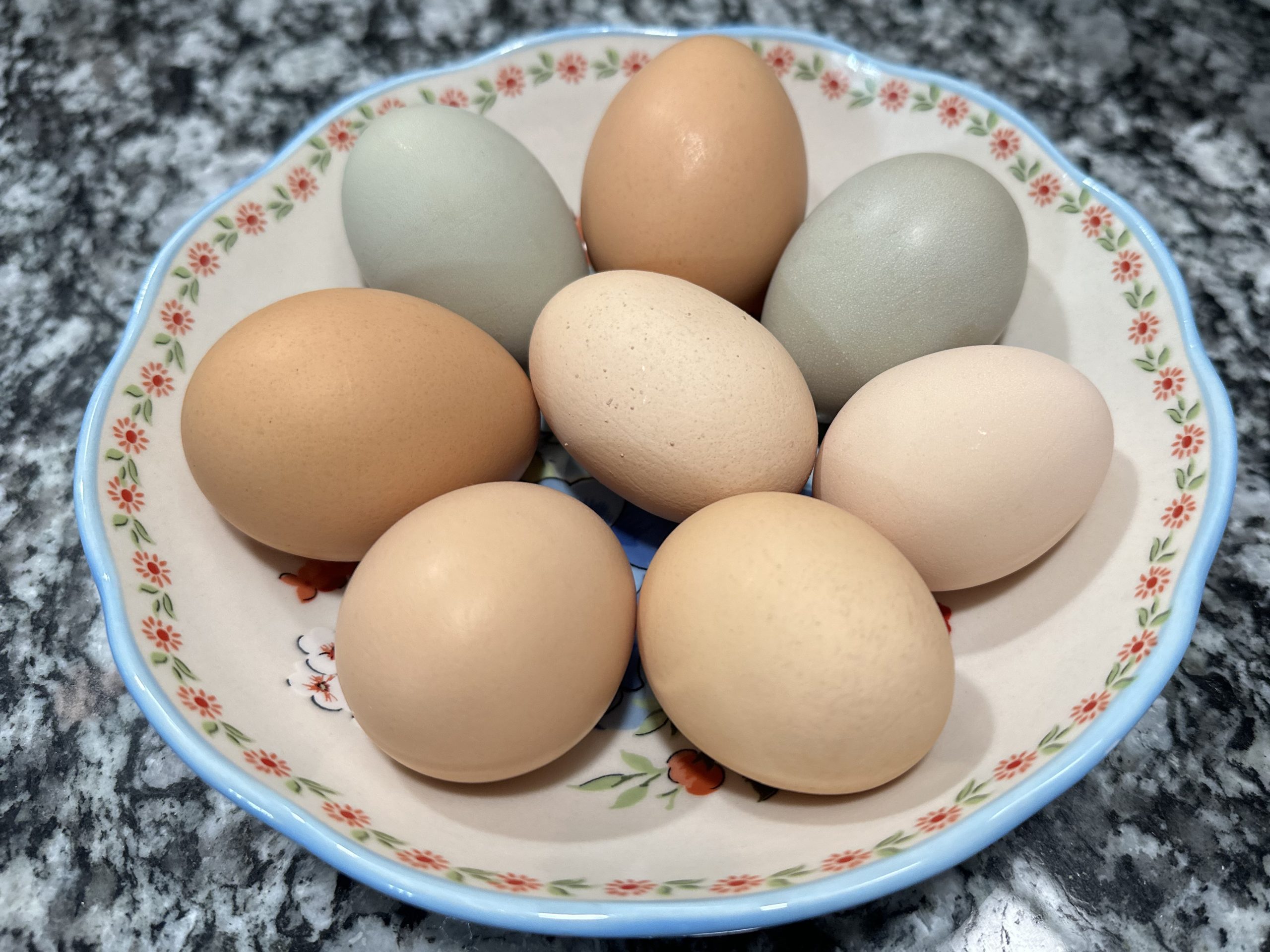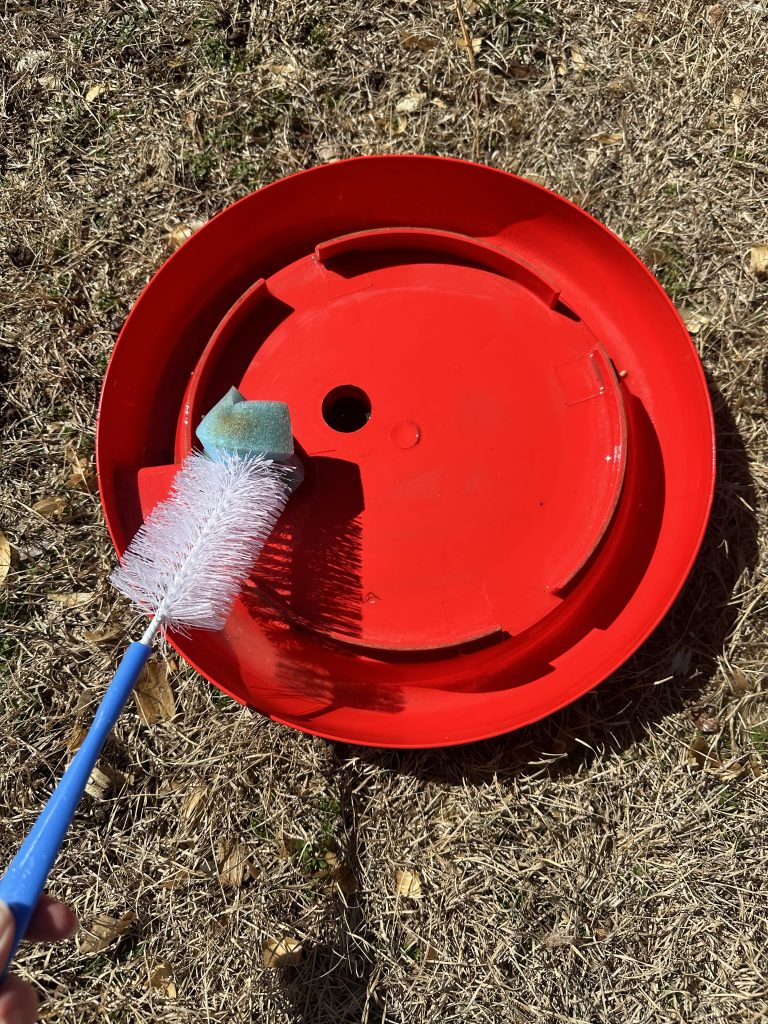Maintaining cleanliness with chickens and eggs

Whether you’re a backyard chicken keeper or you purchase eggs from a grocery store, most families consume eggs every week, whether it’s in pancake batter, an omelet or hard-boiled eggs to decorate for Easter. But have you ever considered how eggs are made and kept safe from contamination?
For hens, ovulation occurs every 24 to 26 hours, thus an egg is laid almost every day, but some hens can lay daily at their peak production time. The incredible egg process occurs from the inside out. The first step in the 26-hour egg process is the release of the yolk into the oviduct, which happens in the first half hour of the cycle. Over the next three hours, the egg white is formed around the yolk. The shell membranes are then added to form the shape of the egg, which takes one hour. Finally, the last 20 hours are used to form the shell around the egg.
Since it takes 26 hours for an egg to fully form, a hen’s laying time is slowly adjusted to later and later each day. At some point she will skip a day of laying because her ovulation will be triggered too late to produce an egg.
Once an egg is ready to be laid, it makes its way to the vagina, where the bloom, or protective coating is added. This seals the pores of the egg shell to prevent bacteria—namely Salmonella—from infiltrating the egg. Finally, the egg receives a natural lubricant before it enters the cloaca to make it easier to emerge from the vent. Fun fact, hens will often cackle before and after they lay an egg to let everyone know of their accomplishment!
To be clear, the cloaca is also the orifice where chickens defecate from, so when you hear the saying that chickens poop breakfast, it’s an entirely accurate statement. It doesn’t sound sanitary, but the egg laying process is designed to protect the interior of the egg, whether it’s served sunny side up or developed into a baby chick.
Egg storage
Prior to starting my flock, it was engrained in me that eggs have to be refrigerated or they will spoil. This is true for cleaned eggs purchased at a grocery story, but the rules are different with fresh eggs from a backyard flock. As mentioned previously, every chicken egg is laid with a protective coating, called the bloom. This armor is invisible and it is why eggs can sit in the coop for hours or days in the summer heat and be perfectly safe to eat. The bloom also protects a developing chick from bacteria if the egg has been fertilized.
When collecting and storing eggs for human consumption, there are some differing options. Some people wash every egg and place them in the refrigerator. Beware, washing an egg will remove the bloom, which shortens the shelf life and prevents them from being stored at room temperature. Washed and refrigerated eggs can last about two months. Some chicken owners leave fresh eggs on the kitchen counter and do not wash them until they are ready use them. Room temperature eggs with the bloom usually last two to three weeks.
Another practice is to place fresh eggs straight in the refrigerator without washing them and only rinsing the eggs right before use. This method extends the shelf life to about 3 months. My technique is to put unwashed eggs in the refrigerator or leave them on the counter as long as they have no feces on them. If an egg is dirty I wash it and put it in the refrigerator.
Another helpful strategy for keeping track of the age of your eggs is to write the date on each egg as you collect them. Eating the oldest eggs first keeps them from going bad if you are in an egg boom and can’t keep up with your hen’s production numbers. It is important to remember there is no right or wrong method, do what works for you.

Coop hygiene
A large portion of keeping chickens involves cleaning. Chickens are not known for their sanitation skills and sometimes it seems they get joy out of pooping in inappropriate places. Although scooping chicken litter is not the most glamorous part of owning chickens, hygiene is important to food and animal safety. How often you clean you coop depends on the size, number of chickens and whether they are free-range or confined. I do not have a set schedule, but try to get my shovel out when the droppings start to pile up and I have a good day to devote to the task.
To protect yourself from dust, ammonia or bacteria that could be floating around the coop when you stir up the dropping, it is recommended to wear a face mask. It’s no fun wearing an N95 for several hours in the sweltering heat, but you can really tell the difference when you blow your nose if you don’t wear one. Yuck! I do not wear gloves or protective goggles, but some people do. The amount of ventilation in your coop can affect how concentrated the dust is. I am able to open two double doors at the front of my coop, so I feel like it is safer to clean than some other coops.
After scooping the litter, you can wipe the floors, walls, roost and laying boxes with warm soapy water or equal parts water and vinegar to give it a fresh smell and kill bacteria. Do not use bleach. I do not usually wipe my coop down as the walls are textured and they are difficult to clean. Every coop is different. Just do your best! Next, spread fresh wood chips, sand or whatever bedding you choose. Another biosecurity measure is to apply lime to the coop floors. This kills pathogens and reduces fly issues. The coop won’t stay clean for long, but it’s fun to admire for a short time and any bacteria you can kill is a win!
Biosecurity

When it comes to cleaning feeders and waterers, I use Dawn dish soap and a scrub brush. Cleaning feeders and water containers is crucial to flock health as diseases, parasites and bacteria are often spread this way. For parasites specifically, you have to stop the cycle of reinfection. If you only worm your chickens, but never clean out their coop, they will continue to ingest more worms and cycle will continue
Lastly, wash your hands! Anytime I touch a chicken, an egg or go into my coop, I always wash my hands as soon as I enter my house. I also throw some hand sanitizer in for good measure if I’ve been doing a particularly dirty task. Chickens are wonderful creatures, but they can also spread disease. As chicken tenders, we have to make up for their sanitation shortcomings. We must understand the risks of keeping backyard birds and actively prevent the spread of disease from spreading to humans or the girls.
Lacey Vilhauer can be reached at 620-227-1871 or [email protected].



